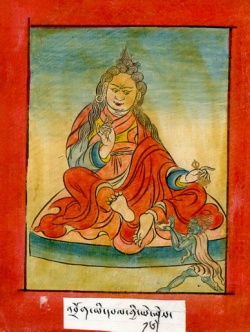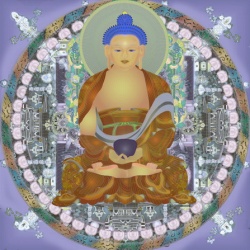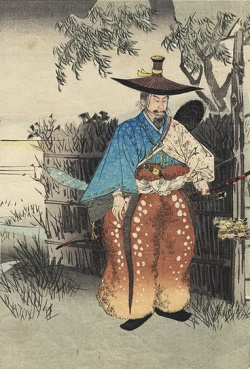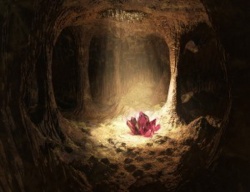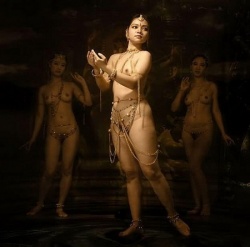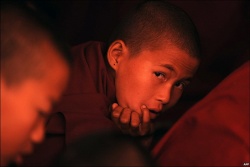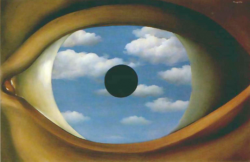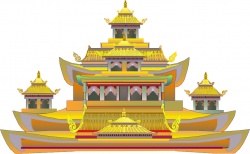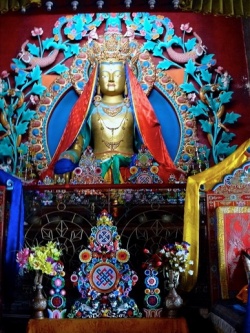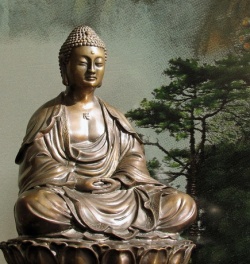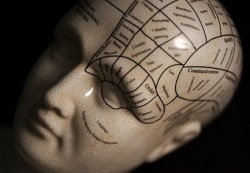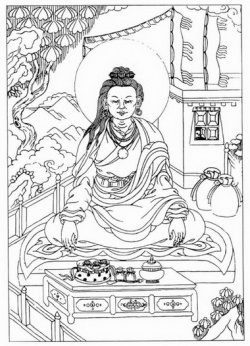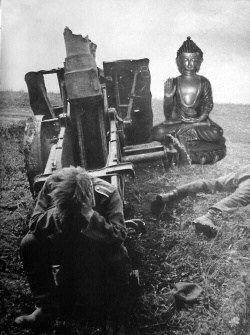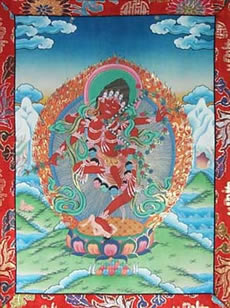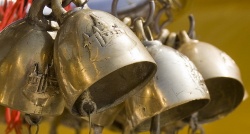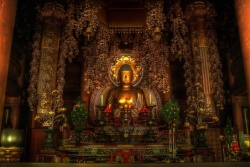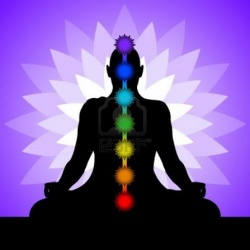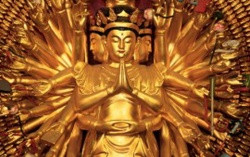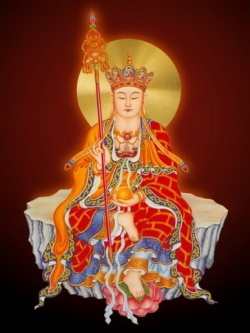Nirvana Sutra: Chapter Twenty-Three: On Pure Actions-3
Mahayana Mahaparinirvana Sutra
Translated by KOSHO YAMAMOTO
FROM Dharmakshema's Chinese version
The World's genuinely first-ever web edition of this complete scripture
(This "Yamamoto/page edition" is Copyright of Dr. Tony Page, 2004 )
The Complete Kosho Yamamoto English Translation of the "Nirvana Sutra", edited and revised by Dr. Tony Page, typographically improved by Jay and Gabriele Mazo
Chapter Twenty-Three: On Pure Actions-3
Bodhisattva Kasyapa said: "The Buddha-World-Honoured One once said to Shariputra: "What the world knows I also know; what the world does not know, I also know all." What does this mean?" "O good man! The world does not know, see or realise the Buddha-Nature. If there is a person who knows, sees, and realises the Buddha-Nature, we do not call such a person one of the world. We say "Bodhisattva". The world also does not know, see, or realise the twelve types of scripture, the twelve links of interdependent arising, the four inversions, the Four Truths, the 37 factors leading to Enlightenment, unsurpassed Enlightenment, and Great Nirvana. If (these are) known, seen or realised, we do not say "of the world"; we say "Bodhisattva". O good man! This is what we mean when we say that the world does not know, see or realise. How does the world know, see or realise? So-called Brahma, Mahesvara, Narayana, nature, time, mote, dharma, non-dharma are the creators. They talk about an end and a beginning, about the "is-not" and "is" of the world and say that "Nirvana commences from the first dhyana and ends in non-thoughtlessness". O good man! This is what the world knows, sees and realises. The Bodhisattva knows, sees, and realises such. The Bodhisattva already has known, seen and realised such. If we say that he does not know, see or realise, this is nothing but falsehood. What is false constitutes sin. On account of this sin, one falls into hell. O good man! If any man, woman, sramana or Brahmin says that there is no such thing as the Way, Enlightenment or Nirvana, know that such a person is an icchantika (most spiritually deluded person). Such a person is one of Mara's kindred. This is slandering Dharma. Such slandering is a slandering of all Buddhas. Such a person is not of the world, and not "not-of-the-world."
Then Kasyapa, on hearing this, praised the Buddha in a gatha, saying:
"The Great Compassionate One pities beings
And has them take refuge in him.
He well extracts all poisonous arrows.
So I call him a great doctor.
A worldly doctor effects a cure.
He cures indeed, but the illness returns.
The Tathagata cures, but the illness does not return.
The World-Honoured One gives
All beings amrta (the ambrosia of immortality).
When beings partake of this,
They do not die, nor do they get re-born.
The Tathagata expounds to me
Hear the closely guarded doctrine,
They gain birthlessness and deathlessness."
Having sung thus, Bodhisattva Kasyapa said to the Buddha: "O World-Honoured One! The Buddha says: "The Bodhisattva does know, see and realise what the world knows, sees and realises". If it is the case that the Bodhisattva is here in the world, we cannot say: "The world does not know, see or realise. But this Bodhisattva well knows, sees and realises." If he is not of the world, what different characteristics does he have?"
The Buddha said: "O good man! The Bodhisattva is of the world and not of the world. What does not know, see, and realise is the world; he who does know, see, and realise is not of the world. You ask: "What difference is there?" I shall now explain. O good man! If any man or woman hears this Nirvana Sutra, feels respect, and aspires to unsurpassed Enlightenment, such a person is a Bodhisattva of the world. All the world does not know, see, or realise. Such a Bodhisattva, too, does not know, see, or realise, as in the case of the world. When the Bodhisattva hears this Nirvana Sutra, he comes to know that the world does not know, see, or realise, and that this is what the Bodhisattva should come to know, see and realise. Having come to know of this, he thinks to himself: "How am I to effect an expedient and learn and come to know, see, and realise?" He further thinks: "I shall uphold the pure shila (moral rules) with the deepest mind. O good man! On this account, the Bodhisattva, in the world to come, is pure in all places where he gets born. O good man! As the Bodhisattva-mahasattva is pure in shila, in whatever place (he finds himself) he has no arrogance, no wrong views, no doubt, and never, to the end, says that the Tathagata ever enters Nirvana. This is how the Bodhisattva observes pure shila. The precepts are already pure (with him). He then next practises meditation. Through practising meditation, wherever he may be, he abides in right remembrance and does not forget. That is to say that beings all have the Buddha-Nature; that there are the twelve types of scripture, and that the All-Buddha-World-Honoured One is the Eternal, Bliss, the Self, and the Pure. All Bodhisattvas abide in the vaipulya Great Nirvana Sutra and see the Buddha-Nature. They rightly remember all of this and do not forget. Through practising dhyanas (meditations), they gain eleven shunyatas (emptinesses). This is the practising of the pure meditation of the Bodhisattva. Achieving shila and meditation, they next practise pure Wisdom. By practising Wisdom, they first see the Self in the body and the body in the Self. There are no such clingings as: this body, this Self, no body, and no Self. This is practising the pure Wisdom of the Bodhisattva. By practising Wisdom the shila which he observes is steadfast and does not move. O good man! It is like Sumeru, which does not shake, in spite of the winds from the four quarters. The same is the case with the Bodhisattva-mahasattva. He does not shake, in spite of the four inversions. O good man! The shila which the Bodhisattva knows, sees and realises and upholds at that time does not shake. That is why we say that what the Bodhisattva knows, sees and realises is not of the world. O good man! The Bodhisattva has no repentance in his mind when he sees that the shila he upholds is steadfast. As there is no regret, there is joy in his mind. As he has joy, his mind is happy. As he is happy, his mind is at peace. As his mind is at peace, there comes about an immovable samadhi. As the samadhi is immovable, there is true knowing and seeing. Due to true knowing and seeing, there is parting from birth and death. Parting from birth and death, he achieves emancipation (“vimukti”). As a result of emancipation, he clearly sees the Buddha-Nature. This is what we mean when we say that what the Bodhisattva knows, sees, and realises is not something that obtains in the world. O good man! This is what the world does not know, see, or realise."
Kasyapa further said: "In what way does the Bodhisattva not repent as he upholds the pure shila, and how does he clearly see the Buddha-Nature?" The Buddha said: "O good man! The shila that obtains in the world is not pure. Why not? Because the shila that obtains in the world is grounded on "is", and because its nature is not fixed and is not the utmost. It stands not widely for all beings. Hence, we say "non-pure". Not being pure, there is regret. Because of regret, the mind knows no joy. As there is no joy in the mind, there is no happiness. As there is no happiness, there is no peace. As there is no peace, there is no immovable samadhi. As there is no immovable samadhi, there is no true knowing and seeing. As there is no true knowing and seeing, there is no fleeing from the world. As there is no fleeing from the world, there is no emancipation. As there is no emancipation, there is no seeing of the Buddha-Nature. As there is no seeing of the Buddha-Nature, there is no gaining of Great Nirvana. This is what we call the impure shila that obtains in the world.
"O good man! We speak of the pure shila of the Bodhisattva-mahasattva because the shila is no shila, not for existence, but the ultimate in samadhi, and is for the benefit of beings. This is the pure shila of the Bodhisattva. Although the Bodhisattva-mahasattva does not desire to gain any non-regretting mind through pure shila, the non-regretting mind spontaneously arises. O good man! If, for example, a man holds a bright mirror in his hand, his face will appear in it, even if he does not wish it to appear there. It is also as in the case of a farmer who sows good seed in a good field, after which buds spontaneously emerge there, even were this not so desired. Also, it is like lighting a lamp, when the gloom automatically disappears, even though such may not be desired. As the Bodhisattva-mahasattva steadfastly observes the purity of shila, a non-regretful mind will automatically arise. The case is thus. Through the purity of the shila, the mind gains joy. O good man! It is like the mien of a man of straight (honest) mind, which is pleasing to behold. The same is the case with a person who observes the purity of shila.
"O good man! One's mind does not feel pleased when one sees the impurity of shila of a person who violates shila. This is like seeing the ill-looking (unattractive) face of a cruel person, when one does not feel any joy. The situation is the same with a person who violates shila. O good man! As an example: there are two pasture women. One holds in her hand a pot of cream, and the other a pot of milk. Both go to the castle-town, wishing to sell (their produce) there. On the way, they take a tumble, and the pots get broken. The one woman is happy, and the other is sad and worried. It is the same with upholding and not upholding shila. The person who upholds the purity of shila has a joyful mind. Glad at heart, that person thinks: "The All-Buddha-Tathagata says in his Nirvana Sutra that a person who upholds the purity of shila will gain Nirvana. Since I now uphold the purity of shila, I shall surely attain it. Because of this, my heart is glad."
Kasyapa said further: "What difference is there between "joy" and "bliss?" "O good man! When the Bodhisattva-mahasattva does not commit any evil, there is joy with him. When the mind is pure, and when one upholds shila, there is bliss. O good man! When the Bodhisattva sees birth and death, this is joy. When he sees Great Nirvana, there is bliss. What is low in grade is joy, and what is high in grade is bliss. When one departs from the property gained in common with others, there is joy. When one attains individually gained property, there is bliss. When shila is pure, the body is light and soft, and one's speech knows no coarseness. Then, the Bodhisattva can see, hear, smell, taste, touch, and know, and there is nothing that is evil (in these sensations). With no evil, the mind is at peace. Because of peace, he gains the quietude of samadhi. As he gains the quietude of samadhi, he truly knows and sees. When he truly knows and sees, he flees from birth and death. When he flees from birth and death, he gains emancipation. When he gains emancipation, he sees the Buddha-Nature. When he sees the Buddha-Nature, he gains Great Nirvana. This is the pure upholding of shila by the Bodhisattva. This is not what applies in the upholding of shila in secular life. Why not? O good man! The pure shila which the Bodhisattva-mahasattva upholds is supported by five things. What are these five? They are: 1) faith, 2) feeling ashamed of oneself for any sin that one has committed, 3) feeling ashamed of others, for any sin they have committed, 4) a good friend of the Way, and 5) respect-adding (increasing) shila. Because one segregates oneself from the five overshadowings (“panca-avaranani”). Because what one sees is pure, as one is separate from the five distorted views (“panca-drstayah”). There is no element of doubt, since one is away from the five doubts, which are doubting: 1) the Buddha, 2) Dharma, 3) Sangha, 4) shila, and 5) non-indolence. The Bodhisattva then gains the five roots, which are: 1) faith, 2) remembrance, 3) effort, 4) meditation, and 5) Wisdom. Through the five roots, he gains the five kinds of Nirvana, which are emancipation from: 1) rupa (body, matter) down to consciousness (i.e. emancipation from the five skandhas). This is the Bodhisattva's pure upholding of shila. This is not of the secular world. O good man! This is what the secular world does not know, see, or realise. This is what the Bodhisattva knows, sees, and realises.
"O good man! If any of my disciples uphold, recite, copy and speak about the Great Nirvana Sutra and violate the moral precepts, people will reproach them, look down upon them, and say: "If the Mahaparinirvana which the Buddha closely guards is supposed to have power, how come that it makes you thus violate the moral precepts which you have received? If it is the case that anybody upholding this Nirvana Sutra breaks the prohibitive rules, know that this sutra has no power. If it has no power, there can never be any merit (from it), even if one recites it." By belittling and transgressing against this Nirvana Sutra, all innumerable and boundless (numbers) of people have to fall into hell. Anyone who upholds this sutra and breaks the moral rules is a very bad teacher of the Way. Such is no disciple of mine, but one of Mara's kindred. I do not permit such a person to hold this sutra. It is better not to allow such a person to receive, possess and practise than to allow him to transgress, uphold and practise shila.
"O good man! Any disciple of mine, when upholding, reciting, copying, or speaking about the Nirvana Sutra, should be serious in the deportment of his body and mind and should be careful not to play around and behave lightly. What refers to body is "playing around"; what refers to mind is "behaving lightly". The mind that seeks "is" is what "behaves lightly"; the body that does many things is that which "plays around". Any of my disciples who seek "is" and act cannot receive and hold this Mahayana Great Nirvana Sutra. Should any (such) be holding this sutra, people will belittle and reproach him, saying: "If the Buddha's close-guarded Nirvana Sutra possesses any power, how can it be that he permits you to seek "is" and act? If anyone who holds this sutra seeks "is" and acts, know that this sutra has no power. If it cannot generate any great power, it is useless to possess this sutra." When a person thus belittles this sutra, innumerable and boundless (numbers of) beings will have to fall into hell. Should a person possess this sutra, see "is" and act, such a person is none but the worst friend of the Way. Such a person is not one of my disciples, but a kindred of Mara.
"And next, O good man! Any disciple of mine who receives, recites, copies, and speaks about this Nirvana Sutra should not speak about it at an untimely moment, in a land where one should not preach, not when one is not asked to preach, not with a light mind, not in all places, not speak about it, praising it by oneself, not speak of it while belittling others, not by killing the Buddhist teaching, and not by burning out secular dharma. O good man! If any of my disciples receive and hold this sutra and speak about it at an untimely moment or down to burning off of secular dharma, people will belittle it and say: "If there is any great power in the Buddha's closely guarded Great Nirvana, how can it allow you to speak of it at an untimely moment or burning out secular dharma? If a person who possesses this sutra acts like this, then know that this sutra has no power. If it has no power, there is no benefit (to be had from it), even if you hold it." Through belittling this Nirvana Sutra, innumerable beings are caused to fall into hell. If one receives and upholds this sutra and speaks of it on untimely occasions down to burning off of secular dharma, such a person is the worst friend of all beings. Such a one is not a disciple of mine, but is of Mara's kindred.
"O good man! What is required first of all of anyone who desires to keep this sutra, who speaks of Great Nirvana, who speaks of the Buddha-Nature, who speaks of the hidden Dharma of the Tathagata, who speaks of Mahayana, who speaks of the vaipulya sutras, who speaks of the sravaka vehicle, who speaks of the pratyekabuddha vehicle, who sees the Buddha-Nature, is to make the body pure. When the body is pure, there can be no grounds for reproaching. When there is nothing to reproach, this enables beings to gain the pure mind in this Great Nirvana. When faith arises, one respects this sutra. One hears a gatha, a line, or a word, or one speaks of Dharma, (and) one aspires to unsurpassed Enlightenment. Know that this person is a true, good teacher of the Way to all beings. Such a person is not a bad teacher of the Way. Such is a disciple of mine and not of Mara's clan. This is what we mean when we say that the Bodhisattva is not of the world. O good man! This is what the world does not know, see, or realise. This is what the Bodhisattva knows, sees, and realises.
"Also, next, O good man! What is that which all the world does not know, see, or realise, and which the Bodhisattva knows, sees, and realises? This is the six thinkings. What six? These are: 1) thinking of the Buddha, 2) thinking of Dharma, 3) thinking of the Sangha, 4) thinking of shila, 5) thinking of dana (charitable giving), and 6) thinking of the devas.
"O good man! What is thinking of the Buddha? This is saying that the Buddha, who is the Tathagata, Alms-Deserving, All-Enlightened One, All-accomplished One, Well-Gone, All-Knower, Best Trainer, Teacher of Gods and Humans, Buddha and World-Honoured One is eternal and does not change, possessed of the ten powers, the four fearlessnesses, uttering the lion's roar, and is a great sramana and a great Brahmin. His great pureness ultimately carries a person to the other shore. No one supercedes him, and none can see the top of his head. There is no fear, no being frightened, and no moving (with him). One and alone, none to accompany him, and none to teach him, he is perfectly awake in all such treasures of knowledge as quick-acting knowledge, great knowledge, bright knowledge, deep knowledge, emancipation knowledge, unshared knowledge, widely-suffusing knowledge, and ultimate knowledge. He is, of men, the elephant king, the cow king, the naga king, the strongest male, the white lotus, and the best trainer. He is the great giver, the great teacher of Dharma. As he knows Dharma, he is called "teacher of Dharma". He is called the teacher of Dharma because he knows the meaning, because he knows the (apt) time, because he knows how to be contented, because he knows by himself, because he knows the masses (of beings), because he knows the various natures of beings, because he knows, of all natures, the sharp, the dull, and the medium, and because he speaks of the Middle Path.
"Why do we say “Tathagata”? Because he does not change, as already taught by all Buddhas in the past. Why does he not change? All Buddhas in the past, in order to succour beings, delivered the twelve types of scripture. The same with the Tathagata. So we say "Tathagata". The All-Buddha-Tathagata comes from the six paramitas, the 37 factors leading to Enlightenment, the 11 shunyatas, and enters Great Nirvana. The same is the case with the Tathagata, too. That is why he is called the Buddha and the Tathagata. The All-Buddha-Tathagata enacts expedients as he wills for the sake of beings, and opens up the three vehicles. His life is infinite and boundless. The same is the case with the Tathagata too. That is why the Buddha is called the Tathagata.
"Why is he called "one worthy of the offerings made him"? Whatever is of the world is the enemy. As the Buddha has to crush this out, he is called "one who answers" (i.e. one who answers the challenges of Mara). Now, the four Maras are the enemies of the Bodhisattva. The All-Buddha-Tathagata, when still a Bodhisattva, thoroughly vanquished the four Maras through Wisdom. Hence, "one who answers". Also, next, "to answer" means "to segregate". While a Bodhisattva, he segregated himself from innumerable defilements. Hence, "to answer". Also, next, "to answer" means "bliss". All Buddhas in the past, as Bodhisattvas and for innumerable asamkhyas of kalpas, underwent all kinds of suffering, and yet there was no "non-bliss" to the end, but always "bliss". The same was the case with the Tathagata. Hence, "to answer". And also, all humans and devas offer him various kinds of incense, flowers, garlands, flying and hanging banners, and music. Hence, "to answer".
"Why do we say “sho-henji” (“samyaksambuddha”)? "Sho" means "not upside-down"; "henji" means that there is nothing in the four inversions that he does not know. And also, "sho" means "penance". We say "henji". By virtue of penance, one knows that sorrowful fruits definitely arise therefrom. And also, "sho" is the middle path in secular life. "Henji" means that as one definitely practises the Middle Path, one attains unsurpassed Enlightenment. And, also, "sho" connotes that it is possible to count, weigh, and tell out (describe, proclaim); "henji" means that it is not possible to count, weigh, and tell out. That is why the Buddha is the "All-Enlightened One". O good man! With the sravakas and pratyekabuddhas, there are cases where they have henji or where they do not. How so? "Hen" means the "five skandhas", "twelve spheres", and "eighteen realms". And the sravakas and pratyekabuddhas can also gain henji. Hence, "to know all-pervadingly". What is "not knowing all-pervadingly"? O good man! The two vehicles cannot know rupa (body, form) all through, even if they meditate on it for innumerable kalpas. Hence, there can be no case where the sravakas and pratyekabuddhas can know all the way through.
"What is “myo-gyo-soku” (“vidyacaranasampanna”)? Myo means to gain innumerable good fruits, and gyo means leg. Good fruit means unsurpassed Enlightenment, and leg means shila and Wisdom. Riding on the legs of shila and Wisdom, one gains unsurpassed Enlightenment. Hence, myo-gyo-soku. And also, myo means to charm, gyo means good, and soku fruit. O good man! This is what the world thinks it means. To charm means emancipation; good means unexcelled Enlightenment; the fruit refers to Mahaparinirvana. Hence, myogyosoku. And also, myo means light, gyo action, and soku fruition. O good man! This is the meaning which the world accepts for these terms. Light relates to non-indolence, action to the six paramitas, and fruition to unsurpassed Enlightenment. And also, myo means three brightnesses, which are: 1) Bodhisattva brightness, 2) all-Buddha brightness, and 3) ignorance-destroying brightness. The Bodhisattva brightness is the paramitas; the all-Buddha brightness is the Buddha-eye; ignorance-destroying brightness is the ultimate Void. By action is meant that one performs all kinds of good actions over innumerable kalpas for all beings. Foot (soku) betokens "clearly seeing the Buddha-Nature". Hence, we say myogyosoku.
"What does “zen-zei” (“sugata” - "well-gone") mean? Zen means high, and zei means not high. O good man! This is what the world takes it to mean. High relates to unsurpassed Enlightenment, and not high to "Tathagata mind". O good man! Anyone whose mind is high is not called "Tathagata". That is why the Tathagata is called zenzei. And also, good (zen) connotes "good teacher of the Way". "Zei" is the fruition of the good teacher of the Way. O good man! This is what the world takes it to mean. Good teacher of the Way means the first budding of Bodhichitta (Enlightenment Mind). Fruition is none other than Great Nirvana. The Tathagata, not abandoning the first budding of the mind, arrives at Great Nirvana. For this reason, the Tathagata is the "well-gone". And also, zen indicates "to like", and zei indicates "is". O good man! This is as the world takes the meaning. "To like" refers to seeing the Buddha-Nature, and "is" is Great Nirvana. O good man! The nature of Nirvana is not really "is". The All-Buddha says "is" when he is addressing the world at large. O good man! For example, a person does not have a son, but people say that he has. Though, in truth, they have no "Way", they say that they do. The same is the case with Nirvana. Because of standing on this ground of the world at large, we say "is". The All-Buddha-World-Honoured One attains Great Nirvana. Hence, "well-gone".
"What do we mean by “seken-ge” (“lokavid” - knowledge, understanding of the world)? "Seken" denotes the five skandhas, and "ge" means "to know". The All-Buddha-World-Honoured One thoroughly knows the five skandhas. Hence, "understanding the world well". Also, "world" means the "five desires", and "ge" "non-clinging". When one does not cling to the five desires, this is "one who well understands the world". We say "world". All the sravakas and pratyekabuddhas, as numerous as asamkhyas of countries in the east, do not see and know. But all Buddhas know all, see all, and understand all. So is it with the countries in the south, west, north, the four corners, and the lands up and down. Thus the Buddha is one who knows the world. Also, "world" refers to "all beings"; "to know" relates to the good and bad causes and effects of all beings. This is not something that can be known by sravakas and pratyekabuddhas. The Buddha alone knows. That is why we say that the Buddha is the "All-Knower". Also, the world is "lotus", and "to know" means "not to get defiled". O good man! This is what the world takes things to be. "Lotus" is the Tathagata; "not getting defiled" means that the Tathagata does not get defiled by the eight things of the world (possibly: profit, weakening, destruction, honour, praise, slandering, suffering, and bliss). Hence, we call the Buddha the "All-Knower". Also, all Buddhas and Bodhisattvas are called "All-Knowers". Why? Because of the fact that all Buddhas and Bodhisattvas see the world. Hence, "All-Knower". O good man! This is as when one gains life from food, as a result of which we call food "life". The same is the case with all Buddhas and Bodhisattvas. As they know the world, they are called "All-Knowers".
"Why do we say “mu-joshi” (“anuttara” - the "unsurpassed one")? "Joshi" means "to cut". One who does not need to cut anything is the unsurpassed one. So the Buddha is the unsurpassed one. Also, "joshi" means "quarrel". The unsurpassed one has no quarrel. The Tathagata has no quarrel. So the Buddha is the unsurpassed one. And "joshi" means that the words can be destroyed. The word, "mujoshi", is not one that can be destroyed. Beings cannot destroy what the Tathagata says. So, the Buddha is the unsurpassed one. Also, "joshi" means "top seat" (“sthavira” - an honorific, meaning "aged", "old", "venerable"). "Mujoshi" means that there is no seat that is higher. No one surpasses the Buddhas of the Three Times. So, we call the Buddha the "unsurpassed one". "Jo" is "new", and "shi" "old". The All-Buddha-World-Honoured one dwells in Great Nirvana, and there is no talking of new or old. So, we call the Buddha the "Unsurpassed One".
"Why do we say “jägo-jäbu” (“purusadamyasarathi” - "trainer of men/ persons")? Being a man himself, he trains men. O good man! The Tathagata is no man, and is not no-man. As he perfects man, the Tathagata is called a man. If any man or woman is perfect in four things, such a one is a man (human). What four? These are: 1) (being) a good teacher of the Way, 2) listening well, 3) thinking well, and 4) practising the Way well as told. O good man! If any man or woman fails in these four things, he or she is not a human. Why not? Because, though the body is that of a human, the action is that of an animal. The Tathagata trains and breaks in men and women. For this reason, the Buddha is called the "the best trainer". Also, next, O good man! There are four ways of breaking in a horse. These are to touch: 1) its hair, 2) its skin, 3) its flesh, and 4) its bone. By touching, the trainer's will is carried out. It is the same with the Tathagata. Beings get broken in in four ways. First, he speaks of birth, and beings accept the Buddha's words. This is like the driver touching the hair, by which his will is carried out. Second, he speaks of birth and death, and beings accept the Buddha's words. This is as when the hair and skin are touched, by which the trainer's will is carried out. Thirdly, he speaks of birth, old-age, and illness, and beings accept the Buddha's words. This is like touching the hair, skin and flesh, by which the trainer's will is carried out. Fourthly, he speaks of birth, old-age, illness, and death, and the Buddha's words find acceptance. This is as when the trainer's will is carried out as his hand touches the hair, skin, flesh, and bone. O good man! There is nothing definite when a trainer breaks in a horse. When the Tathagata-World-Honoured One subdues beings, this is definite and there is nothing lacking. Hence, we say that the Buddha is the best trainer.
"Why is he the “tenninshi” (“sastadevamanusyanam” - teacher of gods and humans)? Of teachers, there are two kinds. One teaches what is good, and the other teaches what is bad. All Buddhas and Bodhisattvas teach all beings what is good. What is good? It is what is good of body, mouth and mind. All Buddhas and Bodhisattvas teach beings and say: "O good man! You should segregate yourself from the evil actions of the body. Why? Because one ought to segregate oneself from evil actions and attain emancipation. For this reason, I teach you this Dharma. If it were the case that you could not segregate yourself from evil actions and attain emancipation, I would not, to the end, teach you to segregate (yourself from evil). It can never come to pass that any being should segregate himself from evil actions and (then) fall into the three unfortunate realms. Through segregation, one achieves unexcelled Enlightenment and attains Great Nirvana. So, all Buddhas and Bodhisattvas always teach beings this Dharma. It is the same with the situation of the mouth and mind. Hence, the Buddha is the unsurpassed teacher. Also next: before, I was not Enlightened, but now I am. With what (I have) gained, I teach beings. I did not practise pure actions from the very beginning, but now I do so practise. With what I have practised, I address beings. Having done away with ignorance, I also do away with the ignorance of (other) beings. I have myself gained the pure eye and enable beings to dispel the gloom, and give them the pure eye. I know of two truths and also speak to beings about the two truths. On gaining emancipation, I speak to them about this Dharma of emancipation. Crossing the boundless great ocean of birth and death, I likewise enable beings to cross it. Having myself gained fearlessness, I teach and make them fearless. Having myself gained Nirvana, I speak to beings of Great Nirvana. That is why I am the Buddha and the unsurpassed teacher. Heaven is daytime. Up in heaven, the day is long and the nights short. Hence, heaven. And, also, heaven has no apprehension. Hence, what there is is pleasure. So we say heaven. And also, heaven is a lamp. It thoroughly dispels the gloom and makes things very bright. Hence, heaven. Also, it thoroughly destroys the gloom of evil actions, giving one good actions, by which one gets born in heaven. Hence, heaven. And also, heaven is felicity. Due to felicity, we also say heaven. Also, heaven is day. The day has light. So we call the day heaven. Hence, heaven. Man feels much obligation. And also, man has softness (gentleness) in body and speech. Also, man is arrogant. Also, man thoroughly destroys arrogance. O good man! Although the All-Buddha is the unsurpassed great teacher, in the sutras he is also styled the teacher of gods and humans. Why? O good man! Of all beings, only devas and humans can well aspire to unsurpassed Enlightenment, practise the ten good deeds, and attain the fruits of the shrotapanna, sakrdagamin, anagamin, and arhat, and attain unsurpassed Enlightenment. Hence, the Buddha is the teacher of heaven and earth."
"Why do we say “Buddha”? He is awake. Himself awake, he also thoroughly awakens others. O good man! For example, if one is aware that there is a robber present, the robber can do nothing. It is the same here. The Bodhisattva-mahasattva is awake to all the innumerable defilements. Being awake to all defilements, he makes all defilements unable to do anything. Hence, the Buddha. On account of this awakening, he is birthless, ageless, disease-less, and deathless. Hence, the Buddha.
"We say “bagaba” (“bhagavat” - "Lord"). "Baga" means "to destroy"; "ba" means "defilement". As he crushes defilements, he is called “bhagavat”. He is also so called because he well accomplishes Wonderful Dharma; because he well comprehends all teachings (dharmas); because he possesses great virtues and towers above all others; because he has great fame, being known in all ten directions; because he variously makes great offerings; because, innumerable asamkhyas of kalpas ago, he did away with the female quality.
"O good man! Any person, man or woman, who thus thinks of the Buddha, always sees the Buddha-World-Honoured One, while walking, standing, sitting, lying in bed, day or night, in the brightness or in the gloom.
"Why do we say "Tathagata, Alms-deserving, and All-Enlightened One, down to Bhagavat" and give him so many epithets of innumerable virtues? O good man! The Bodhisattva, for innumerable long kalpas past, has respected his parents, the honoured ones (“upadhyaya” - the Buddhist teacher responsible for rites, rules and discipline in a monastic community), all teachers, sthaviras and elders (“ayusmat” - "long-lived" ones), and has always, over innumerable kalpas, practised - for beings' sake - dana, observed the moral precepts, practised forbearance, made effort, practised meditation, attained Wisdom, and has been full of great loving-kindness and compassion, and is perfect in sympathetic joy and equanimity. Because of this, the Bodhisattva now has the 32 signs of perfection and the 80 minor marks of excellence. And also, the Bodhisattva, for innumerable asamkhyas of kalpas, has practised effort, faith, mindfulness, meditation, Wisdom (the “panca-indriya” - the five "sense-organs" or roots), has respected and made offerings to teachers and elders, always caring for the good of Dharma and for food. The Bodhisattva holds, reads, and recites the twelve types of scripture, and for the sake of all beings works for emancipation, peace, and happiness, not caring a whit for his own. Why? Because the Bodhisattva always cultivates the mind (mental attitude, mental state) to flee the world, to renounce home life, (he cultivates) the non-created mind, the mind of non-disputation, non-defilement, non-binding, non-clinging, uncoveredness, and the non-indefinable mind, the mind of non-birth-and-death, non-greed, non-anger, non-ignorance, non-arrogance, non-defilement, non-illusion, non-suffering, the infinite mind, the large mind, the mind of the All-Void, the vacant mind, the non-vacant mind, the non-trained mind, the non-protected mind, the non-covered mind, the non-secular mind, the mind that is eternally in meditation, the ever-practising mind, the ever-emancipated mind, the mind that seeks non-recompense, the desireless mind, the mind that desires to do good, the non-speaking mind, the softened mind, the non-abiding mind, the unmolested (free, unrestricted) mind, the impermanence mind (mind aware of the impermanence of phenomena), the honest mind, the non-flattering mind, the mind of pure good and the mind that does not care for more or less (i.e. contented mind), the non-hard mind, the mind not of the common mortal, the non-sravaka mind, the non-pratyekabuddha mind, the good-knowing mind, the boundary-knowing mind (mind that knows that an existence has its own boundary line), the mind that knows the world of birth and death, the mind that knows the eternal world, the mind of the unmolested world. Because of this, he now has the ten powers, the four fearlessnesses, great compassion, the three mental states, and the Eternal, Bliss, Self, and the Pure. That is why we can say "Tathagata" down to "Bhagavat". This is the Bodhisattva-mahasattva's way of thinking of the Buddha.
"How does the Bodhisattva-mahasattva think of Dharma? O good man! The Bodhisattva-mahasattva thinks: "The Dharma spoken of by all Buddhas is all-wonderful and best." Grounding themselves in this Dharma, beings arrive at the fruition of the present life. Only this Wonderful Dharma knows no time. What the Dharma-Eye sees is not that of the fleshly eye. And no analogy can gain comparison “(express it)”. Dharma is not something that is born, and it does not die; it abides not, nor does it die away. There is no beginning and no ending. It is not created and is not countable “(cannot be reckoned or calculated)." To the homeless, it becomes his home; to the refugeless and homeless, it is a refuge. To one with no light, it is light. To one not yet arrived at the other shore, it enables him to reach the other shore; to one who has no fragrance, it becomes unhindered fragrance. It cannot be seen. It does not move; it does not turn. Parting eternally from all pleasures, what there is is peace and bliss. It is the Ultimate and the All-Wonderful. It is not matter (“rupa”) and is cut off from matter. And yet it is matter. The same applies down “(all the skandhas)” to consciousness. And it is not consciousness and is cut off from consciousness. And (yet) it is consciousness. It is not action and is cut off from action. It is not binding, nor severing from bonds. It is no substance and is cut off from substance, and yet, it is substance. It is not the world and is cut off from the world, and yet, it is the world. It is not "is" and is cut off from "is", and yet, it is "is". It is not "entering" and is cut off from "entering", and yet, it is "entering". It is no cause and is cut off from cause, and yet, it is cause. It is no result and is cut off from result. It is not false and not true, and is cut off from all that is true, and yet, it is the true. It is not something born, and it does not die, and it is long cut off from birth and extinction, and yet, it is extinction. It has no form that can be seen and is not non-form, and is cut off from all that can be seen, and yet, it is form. It is no teaching and is not no teaching, and yet, it is the teacher. It is no fear and no peace, and is cut off from all fear, and yet, it is peace. It is not patience (“ksanti”) and is not non-patience, and is long away from non-patience, and yet it is patience. It is not tranquillity (“samatha”), is not non-tranquillity, is cut off from all tranquillity, and is yet tranquillity. It is the top (“murdhana”) of all dharmas, and cuts itself away from all defilements. It is pure, has no form to conform to, and is away from all forms. It is the last station of all innumerable beings. It is cut off from the blazing flames of all births and deaths. This is where all Buddhas come to play. It is the Eternal, and there is no change. This is the Bodhisattva's thinking of Dharma."
"In what way does the Bodhisattva "think of the Sangha"? All Buddhas and all holy priests live in accordance with Dharma and obediently practise the Dharma which is straight. One cannot see it, catch hold of it, destroy it, or cause harm to it. It cannot be conceived of and is a good field of weal (“punya-ksetra” - a field of merit, blessings) for all beings. Though it is a field of weal, there is no having it in hand (grasping hold of it). All is pure and undefiled; it is non-”asrava” and non-created; it is vast and boundless. The mind is trained and soft, is all-equal, and is undivided. There is no madding. All is eternal and unchanging. This is how to think of the Sangha.
"How does the Bodhisattva think of shila (the moral precepts)? The Bodhisattva thinks: "There is shila. It is not (to be) transgressed against. It is non-”asrava”, cannot be destroyed, and is not mixed up. Though it has no form or colour, it can be protected. Though there is nothing (about it) that can be touched or felt, one can certainly effect a means and be perfect in it. Nothing is lacking. It is what all the Buddhas and Bodhisattvas praise. This is the cause of the vaipulya and Great Nirvana." O good man! As an example, all such things as the great earth, ships, garlands, great family-clans, the great ocean, ash water, houses, swords, bridges, good doctors, wonderful medicine, agada, cintamani (wish-fulfilling jewel), legs, eyes, parents' gentle attitude: all such things cannot be plundered or have harm caused them. Fire cannot burn them nor water wash them away. Such is a flight of steps that leads up to high mountains or a great hanging banner of all Buddhas and Bodhisattvas. Abiding in this shila, one attains the (level of) shrotapanna. I know that I can, but I do not. Why not? Because if I attain this shrotapanna, I cannot save all beings. If I am to abide in this shila and attain supreme Enlightenment, I, too, can (do this). This is what I desire to have. Why? If I gain supreme Enlightenment, I will indeed be able to speak about All-Wonderful Dharma and succour beings. This is the Bodhisattva-mahasattva's way of thinking of shila.
"How do we think of dana (charitable giving)? The Bodhisattva-mahasattva meditates deeply on this dana, which is the cause of unsurpassed Enlightenment. (He thinks): "All Buddhas and Bodhisattvas perform such dana. I, too, will befriend and practise it." If it is not performed, one cannot adorn the four classes of people of the Sangha. Though giving does not cut away defilements to the (very) end, it certainly extirpates those of the present. By reason of giving, all the beings of the ten directions, as numerous as the sands of innumerable, boundless numbers of Ganges, always praise (such giving). When the Bodhisattva-mahasattva gives food to beings, he gives out life. “As a recompense for this dana, he always is and does not change when he attains Buddhahood.” “As he bestows bliss, peace visits him when he attains Buddhahood. When the Bodhisattva gives, he seeks things in the correct way; he never spoils others through his giving. “Because of this, when he attains Buddhahood, he is blessed with the purity of Nirvana. When the Bodhisattva gives, he so contrives things that beings do not ask and yet are given “(what they need)”. As a result of this, on the morning of Buddhahood, he attains the Sovereign Self (aisvarya-atman; i.e. the autonomous, free and unrestricted Self). By giving, he gives strength to others. Because of this, when Buddhahood arrives, he gains the ten powers. Through giving, he enables others to gain words (the words of the scriptures). By means of this, when Buddhahood comes, he gains the fourfold unhindered knowledge. All Buddhas and Bodhisattvas practise this giving and gain the cause of Nirvana. I, too, will practise giving and engender the cause of Nirvana. This is as was said in the vaipulya “Zäke” (i.e. possibly the “Gandavyuha Sutra”).
"What is thinking of heaven? There are such places as the four guardians' heaven and the thoughtlessness-non-thoughtlessness heaven. If one has faith, one gains the heaven of the four guardians of the earth. I, too, can be born there. If shila, erudition, giving, and Wisdom gain one the four guardians' heaven and the thoughtlessness-non-thoughtlessness heaven, I, too, can be born there. But I do not desire to get born. Why not? Impermanence reigns there in the four guardians' heaven and (also in) the thoughtlessness-non-thoughtlessness heaven. Due to impermanence, there exist birth, ageing, illness, and death. For this reason, I do not desire to be born there. This is similar to phantoms' possibly cheating the ignorant but not the wise. The four guardians' heaven and the thoughtlessness-non-thoughtlessness heaven are analogous to a phantom. The ignorant is the common mortal, but I am not a common mortal. I once heard of the “Paramartha” heaven. This refers to the fact that the Buddhas and Bodhisattvas are eternal and do not change. Because of the Eternal, there is no birth, ageing, illness, or death. I will make effort and seek - for beings' sake - “Paramartha” Heaven. Why? Because “Paramartha” Heaven can decidedly enable beings to cut off the “asravas”, as in the case of the tree of the mind, which one can certainly bend as one wills. If I have faith down to Wisdom, I can certainly gain this “Paramartha” Heaven, and for the sake of beings, one may well think and speak about this “Paramartha” Heaven. This is the Bodhisattva-mahasattva's thinking about heaven. O good man! This is how we say that the Bodhisattva is not of the world. The world does not know, see, and realise. But the Bodhisattva knows, sees, and realises.
"O good man! My disciples might say that there is no difference between holding, reciting, copying, and speaking about the 12 types of scripture and holding, reciting, copying, expatiating upon and expounding the Great Nirvana Sutra. But this is not so. Why not? O good man! Great Nirvana is what is closely guarded by the All-Buddha-World-Honoured One. As it is the deepest and most closely guarded of all the sutras of all the Buddhas, we call it superior. O good man! For this reason, this is a sutra most rare and special, and one difficult to conceive of."
Bodhisattva Kasyapa said to the Buddha: "O World-Honoured One! I also know that this Great Nirvana Sutra is the most rare, most special, and is inconceivable, that the Buddha, Dharma and Sangha are inconceivable, and that the Bodhisattva, Enlightenment, and Great Nirvana are also inconceivable. O World-Honoured One! Why is it that we say that the Bodhisattva is also inconceivable?"
"O good man! Though none teaches, the Bodhisattva-mahasattva well aspires to Enlightenment. Having aspired, he practises and makes effort. Even if a great fire were to burn his body and his head, he would not abandon his intention of seeking emancipation and his thinking of Dharma. Why not? Because the Bodhisattva-mahasattva always thinks to himself: "For innumerable asamkhyas of kalpas, I lived in the realms of hell, hungry ghosts, and animals, amongst humans and gods, and was burnt by the fire of defilement and, until now, was not able to gain one definite Dharma. Definite Dharma is none other than unsurpassed Enlightenment. I do not care about my body and mind, if it is for unsurpassed Enlightenment. I might well pound my body and mind into motes if it be for unsurpassed Enlightenment, but I shall not cease practising the Way and making effort. Why not? Because the spirit of practising the Way and making effort is none other than the cause of unsurpassed Enlightenment." O good man! The Bodhisattva has not yet seen unsurpassed Enlightenment and does not mind sacrificing his body and life for it thus; how could it be otherwise if he has seen it? That is why the Bodhisattva is inconceivable.
"Also, we say inconceivable. We say so because the Bodhisattva-mahasattva sees the countless number of ills connected with birth and death, and this is not what sravakas and pratyekabuddhas can do. Though aware of the countless ills of birth and death, he does not entertain the least desire to flee from the pains which he suffers - and this for the sake of beings. Hence, we say inconceivable. Just for the sake of beings, the Bodhisattva-mahasattva might suffer all the pains of hell, and yet, for him this is nothing other than feeling the bliss of the third dhyana (“tritiya-dhyana” - a meditative absorption characterised by equanimity, alertness, awareness, and a feeling of wellbeing). For this reason, too, we say inconceivable. O good man! As an illustration, a fire starts up in the house of a rich man. He sees this and comes out of the house. His children are left behind and are not free (safe) from the fire. The rich man thinks of the danger from the fire. He goes back and tries to save his children, forgetting all about the danger to himself. It is the same with the Bodhisattva-mahasattva. He knows all about the ills of birth and death. But he faces them and does not mind the danger to himself, just for the benefit of (other) beings. Hence, we say inconceivable.
"O good man! Innumerable minds aspire to Bodhichitta (the resolve to gain Enlightenment). But seeing all the evils of birth and death, the mind pulls back. Some become sravakas and some pratyekabuddhas. But the Bodhisattva, when he hears this sutra, never loses his Bodhichitta and does not become a sravaka or pratyekabuddha. Thus, although the Bodhisattva has not yet risen to the state of the immovable first “bhumi” (stage of Bodhisattvic development), his mind is firmly set and knows of no retardation. Hence, we say inconceivable. O good man! A person might say: "I shall float on the great sea (of suffering) and save (beings)." Can we believe such a statement?" "O World-Honoured One! Such a statement may well be believed, or may not. How so? If it means to say that a human is doing the crossing, this is unthinkable. If it means to say that an asura is, this may well be thought of." "O good man! I do not speak of an asura. I only speak of the human being." "O World-Honoured One! Even amongst humans, there are those who can be thought of and those who cannot. O World-Honoured One! There are two kinds of human. One is the sage and the other a common mortal. The common mortal is not to be thought of; the sage can be." "O good man! I am only speaking of the common mortal, not of the sage." "O World-Honoured One! One such as a common mortal cannot be thought of (in this connection)." "O good man! A common mortal cannot cross the great sea. But this Bodhisattva can indeed cross the great sea of birth and death. For this reason, we say inconceivable. O good man! Is it possible to think of covering Mount Sumeru with the threads (fibres) of a lotus root?" "No is the answer, O World-Honoured One!" "O good man! The Bodhisattva-mahasattva can, in the flash of a moment, count all the births and deaths of all beings. Hence, we say inconceivable."
"O good man! The Bodhisattva-mahasattva has already, over innumerable asamkhyas of past kalpas, meditated on birth and death, impermanence, selflessness, non-bliss, and the impure, and yet, for the benefit of beings, discriminates and speaks about the Eternal, Bliss, Self, and the Pure. Though he speaks thus, this is no twisted view. Hence, inconceivable. O good man! Imagine getting into water and the water cannot drown you; imagine stepping into a great fire, and the fire cannot burn you. We cannot ever conceive of such a thing. It is the same with the Bodhisattva-mahasattva. Although he is in birth and death, no worry and harm can be caused him. Hence, inconceivable.
"O good man! There are three kinds of men, namely: 1) top, 2) middle, and 3) low. He of the low level thinks as he enters the womb: "I am now living in the privy, a place where dirty things turn up, between corpses, amidst thorns and bushes, and in great darkness." And also, when he first emerges (from the womb), he thinks: "I am now coming out of the privy, out of all these dirty and evil places, and out of great darkness." The man of the middle type thinks (as he enters the womb): "I am now entering a forest where there are fruit trees, rivers of pure water, rooms, and houses." When he emerges (from the womb), he also says likewise. The man of the top rank thinks: "I am now up on top of a grand building and in a flowery forest. I am riding on horses and elephants and going up high mountains." It is the same when he comes out (from the womb). The Bodhisattva-mahasattva, when entering, realises that he is now entering the womb; while in the womb, he knows that he is now in the womb; when coming out, he knows that he is coming out. He does not possess a mind of desire or anger, and yet, he has not gained the stage of the first “bhumi”. Hence, he is inconceivable. O good man! Supreme Enlightenment cannot be expressed in parables (similes, analogies). O good man! Neither can the mind be explained by similes and parables. And yet, all has to be explained. The Bodhisattva-mahasattva has no teacher to ask and no place to learn, and yet he attains supreme Enlightenment. After having attained it, he does not think in a stingy way, but always speaks about Dharma for the benefit of beings. Hence, inconceivable. O good man! The Bodhisattva-mahasattva is segregated from the body and is not the mouth; nor is he the mouth, and is not the body. He is neither body nor mouth, and yet there is segregation. We say that he is segregated from the body. This means that he is far removed from killing, stealing, and lust. This is why we say that he is segregated from the body and is not the mouth. We say that there is segregation from the mouth. (This means that) he is segregated from lies, double-tongue, ill-speaking, and meaningless words. This is why we say that he is segregated from the mouth, but not from the body. We say that he is away from the body and mouth. This means to say that he is remote from greed, jealousy, anger, and distorted views. O good man! This is why we say that he is segregated from both body and mouth. O good man! The Bodhisattva-mahasattva is none but the body and action of the one Dharma, and is far away from master (from being a master), and yet is not away from it. Hence, inconceivable. The same with the mouth, too. O good man! His body parts from the body, and his mouth from the mouth; and Wisdom parts from non-body and non-mouth. O good man! There is no case where the one Dharma destroys and creates. The nature of a created thing comes out differently and dies out differently. Hence, Wisdom cannot be segregated. O good man! Wisdom cannot destroy it (i.e. the nature of a created thing), fire cannot burn it, water cannot wash it away, the wind cannot move it, the earth cannot hold it, birth cannot give it birth, age cannot make it old, abiding cannot make it stay, breaking up cannot break it away, greed cannot covet it, anger cannot be angry with it, and ignorance cannot fool it. This is because of the fact that the nature of a created things calls forth different births and different deaths. To the end, the Bodhisattva-mahasattva does not entertain the thought that Wisdom crushes out defilement. And yet he says: "I crush out defilement." Though he speaks thus, this is not false. Hence, inconceivable."
Bodhisattva Kasyapa said to the Buddha: "O World-Honoured One! I have now for the first time come to know of the inconceivability of the Bodhisattva-mahasattva, the inconceivability of Buddha, Dharma and Sangha, of the Great Nirvana Sutra, of the person who holds (upholds) it, and of Enlightenment and Nirvana."
"O World-Honoured One! The life span of the unsurpassed Buddhist teaching must be far and near. When does it end?"
"O good man! Now, the Great Nirvana Sutra has five actions, which are: 1) holy action, 2) pure action, 3) heavenly action, 4) illness action, and 5) child's action. If my disciples uphold, recite, copy, and speak about it, beings will respect it, make much of it, praise it, and make various offerings. Know that the Buddhist teaching (in these circumstances) will not die out. O good man! If when the Great Nirvana Sutra perfectly circulates amongst the people, but all my disciples violate shila, do all manner of evil, and do not believe in this sutra, because of their disbelief they will not uphold, recite, copy and explain the meaning, and (so) they will not be able to be looked up to by the people and no offerings will be made to them. They will see those who uphold shila and will look down upon them, saying: "You are of the group of the six masters (six contemporary teachers of the Buddha's day) and are not the Buddha's disciples." Know that (in these circumstances) it will not be long before the Buddha's teaching dies out."
Bodhisattva Kasyapa said further to the Buddha: "O World-Honoured One! I was once personally taught by you: "The teaching of Buddha Kasyapa lived but seven days and then died out". O World-Honoured One! Did Tathagata Kasyapa leave any kind of sutra behind? If there was anything like that (left behind), how can we say that it died out? If not, how can we say that the Great Nirvana Sutra is closely guarded by all Buddhas?"
The Buddha said: "O good man! I said above that only Manjushri could understand. I shall now repeat it again. Listen carefully, listen carefully! O good man! There are two laws (dharmas) of the All-Buddha-World-Honoured One, namely those of: 1) secular (understanding) and 2) “Paramartha-satya” (Ultimate Truth). The secular law dies out, but not that of “Paramartha-satya”. Also, there are two kinds. One is of the non-Eternal, non-Self, non-Bliss, and the non-Pure; the other is that of the Eternal, Bliss, Self, and the Pure. “The non-Eternal, non-Self, non-Bliss, and the non-Pure die out, but the Eternal, Bliss, Self, and the Pure do not.” “Further, there are two kinds. One is of the two vehicles, and the other is what the Bodhisattva possesses. What the two vehicles possess breaks apart and dies out, but what the Bodhisattva possesses does not. Also, there are two kinds. One is external, and the other internal. The external breaks up and dies, but the internal does not. Also, there are two kinds. One is the created and the other the non-created. The created is subject to dissolution and dies out, but the non-created does not. Also, there are two kinds. One is that which can be had in hand (grasped hold of), and the other is that which cannot. What can be had in hand is subject to dissolution and dies out, but what cannot be had in hand does not decay and die out. Further, there are two kinds. One is what goes together with others and the other is what does not go together with others. What goes together with others (a composite thing) decays and dies out, whereas the one that does not go together with others does not decay and die out. Also, there are two kinds. One is what obtains amongst men, and the other is what obtains in heaven. What obtains amongst men breaks up and dies out, and what obtains in heaven does not break up and die out. Also, there are two kinds, one is the eleven types of scripture, and the other is the vaipulya sutras. The eleven types of scripture break up and die out, but the vaipulya does not break up and die out. O good man! If my disciples possess, recite, copy, expound, respect, make offerings to, highly regard and praise the vaipulya sutras, know that then the Buddhist teaching will not die out.
"O good man! You ask: "Did Tathagata Kasyapa possess this sutra or not?" O good man! The Great Nirvana Sutra is the (most) closely guarded (sutra) of all Buddhas. Why? All Buddhas possess the eleven kinds of sutra, but these do not speak about the Buddha-Nature. These do not say: "The Tathagata is the Eternal, Bliss, Self, and the Pure; he does not ultimately enter Nirvana." For this reason, we call this sutra the closely guarded store. As the eleven types of sutras do not say this (i.e. that the Buddha is the Eternal, Bliss, the Self, and the Pure), we speak of "store". It is as when men do not take out the seven treasures, we speak of "storing". O good man! The reason why this person stores and keeps (things) is for the days to come. What is something for the days to come? So-called cereal is precious. Robbers come and overrun the country, or a person may have to live under a bad king or may have to use this (cereal) to ransom his life. If the roads are bad and wealth is hard to obtain, he will takes this out and use it. O good man! It is the same with the closely guarded store of the All-Buddha-Tathagata, too. All the evil bhiksus of days to come will store up impure things and say to the four classes of the Sangha that the Tathagata does after all enter Nirvana. They will read what circulates in the secular world and will not respect the Buddhist sutras. When such evils appear in the world, the Tathagata desires to make away with all evils, wrong living, and profit-seeking, and he delivers this sutra. Know that when the closely guarded store of this sutra dies out, the Buddhist teaching, too, will die out. O good man! The Great Nirvana Sutra is eternal and does not change. How could you speak ill of it and say: "Was there this sutra at the time of Buddha Kasyapa?" O good man! At the time of Buddha Kasyapa, all people were less greedy and had much Wisdom. It was very easy to teach the Bodhisattvas, as they were soft and malleable. They had great virtue; all was held well and tight. They were like great elephant kings. The world was clean; beings knew that the Tathagata would not ultimately enter Nirvana and that he was the Eternal and Unchanging. Though this sutra existed, there was no need to preach it."
"O good man! The beings of this age have a great deal of defilement. They are ignorant, forgetful, and have no Wisdom. They doubt much, cannot gain faith, and the world is defiled. All people say that the Tathagata is impermanent, that he changes, and that in the end he enters Nirvana. For this reason, the Tathagata delivers this sutra. O good man! Buddha Kasyapa's teaching also does not end indeed. Why not? Because it is Eternal and Unchanging. When there are beings who see the Self as non-Self, non-Self as the Self, the Eternal as non-Eternal, the non-Eternal as the Eternal, Bliss as non-Bliss, non-Bliss as Bliss, the Pure as non-Pure, the non-Pure as the Pure, that which does not end as that which ends, that which ends as non-ending, sin as non-sin, venial sin as grave sin, grave sin as venial sin, vehicle as non-vehicle, the non-vehicle as a vehicle, the Way as non-Way, non-Way as the Way, what truly is Enlightenment as non-Enlightenment, what truly is non-Enlightenment as Enlightenment, Suffering as non-Suffering, the Cause of Suffering as not the Cause of Suffering, Extinction as non-Extinction, the True as non-True, what really is secular as “Paramartha-satya”, “Paramartha-satya” as secular, the refuge as non-refuge, the genuine Buddha-word as Mara's words, what are truly Mara's words as the Buddha-word - at such a time all Buddhas deliver this sermon of the Great Nirvana Sutra.
"O good man! One could sooner say that the proboscis of a mosquito could reach to the bottom of the great ocean than that the Tathagata's teaching becomes extinct. One could sooner say that one can bind the great wind with a rope than that the Tathagata's teaching becomes extinct. One could sooner say that one can blow away Mount Sumeru with one's breath and break it into pieces than that the Tathagata's teaching will become extinct. One could sooner say that amidst the fire of khadira (acacia catechu) the lotus will bloom, than that the Tathagata's teaching becomes extinct. One could sooner say that agada is poison than that the Tathagata's teaching becomes extinct. One could sooner say that the moon can be heated up and the sun made cool, than that the Tathagata's teaching will get extinguished. One could sooner say that the four great elements will lose their qualities, than that the Tathagata's teaching will become extinct.
"O good man! If the Buddha appears in the world, attains unsurpassed Enlightenment, but his disciples do not gain the depths of meaning, and if the Buddha-World-Honoured One is to enter Nirvana, know that this teaching will not live long in the world. Also, next, O good man! If the Buddha first appears, attains unsurpassed Enlightenment, and all his disciples gain the depths of meaning, know that this teaching will live long, even if the Buddha enters Nirvana.
"Also, next, O good man! The Buddha first appears in the world, attains unsurpassed Enlightenment, and his disciples may gain the depths of meaning; but if there are no lay danapatis (alms-givers) who respect the Buddha's teaching, and if the Buddha enters Nirvana, know that this teaching will not survive long. Also, next, O good man! If the Buddha first appears in the world and attains unsurpassed Enlightenment, and all his disciples gain the depths of menaing, and if there are many faithful lay danapatis, who respect the Buddha's teaching, and the Buddha enters Nirvana, then, the Buddha's teaching will live long.
"Also, next, if the Buddha first appears in the world and attains unsurpassed Enlightenment, and all the disciples gain the depths of meaning; also, if there are faithful lay danapatis who look up to the Buddha's teaching and many disciples of the Buddha who speak about the Buddha's teaching; but if they do (all this) for profit and not for Nirvana, know that the teaching will not live long when the Buddha dies.
"Also, next, O good man! When the Buddha first appears in the world and attains unsurpassed Enlightenment, and there are many disciples who gain the depths of meaning; also, there are faithful lay danapatis who respect the Buddha's teaching, and all the disciples preach the doctrine not for profit, but for Nirvana, and the Buddha enters Nirvana - know that this teaching will survive long.
"Also, next, O good man! If the Buddha first appears in the world and attains unsurpassed Nirvana, and all the disciples gain the depths of meaning; and if there are faithful lay danapatis who look up to the Buddha's teaching, but all the disciples dispute, saying this and that, and the Buddha enters Nirvana - know that this teaching will not survive long.
"Also, next, O good man! If the Buddha first appears in the world and attains unsurpassed Enlightenment, and there are disciples who gain the depths of meaning; also, if there are faithful lay danapatis who respect the Buddha's teaching, and all the disciples practise the teaching of peace and harmony and do not dispute (with one another), but respect one another; and if the Buddha enters Nirvana - know that this teaching will live long and not die out.
"Also, next, O good man! If the Buddha appears in the world, attains unsurpassed Enlightenment, and there are disciples who gain the depths of meaning; also, if there are faithful lay danapatis who respect the Buddha's teaching, and all the disciples preach the teaching of Great Nirvana; if they respect one another and do not quarrel (amongst themselves), and yet they store up impure things, and praise themselves, saying: "I have now attained the (level of) shrotapanna up to arhatship" - know, too, that if the Buddha dies, this teaching will not survive long in the world.
"Also, next, O good man! If the Buddha first appears in the world and attains unsurpassed Enlightenment, and if all the disciples gain the depths of meaning, and there are also faithful lay danapatis who respect the Buddha's teaching; and if all the disciples preach the doctrine of Great Nirvana, living in harmony and with respect for one another, and not storing up impure things and not saying that they will attain (the level) of shrotapanna up to arhatship, and if the Buddha-World-Honoured One dies - know that this teaching will live long.
"Also, next, O good man! If the Buddha first appears in the world and attains unsurpassed Enlightenment, and all the disciples do not store up impure things and do not say that they will attain the (level of) shrotapanna up to arhatship; yet if they have clinging to their own views and variously say: "O Elders! The four grave offences, down to the seven ways of adhikarana-samatha (the seven ways of making away with disputes), which all Buddhas have instituted, are accorded with or enlarged upon. It is the same with the twelve types of sutra. Why? Because the Buddha knows that land and time differ and that there are differences in the qualities of beings. For this reason, the Tathagata prohibits or opens out (allows), and there are differences between light (venial) and heavy (grave sin). O Elders! This is as in the case of a good doctor who, when someone is ill, either allows or does not allow milk, and says "yes" to fever and "no" to cold. The same is the situation with the Tathagata. He sees the root of illness of all beings' defilements, and either says "yes" or prohibits. O Elders! I directly heard the Buddha say; (I alone know the meaning and not you; I alone know shila and not you; I alone know the sutras and not you)." If the Buddha dies, know that this teaching will not live long. O good man! If the Buddha first appears in the world and attains unsurpassed Enlightenment, and if there are many disciples who do not say: "I have attained the (level of) shrotapanna up to arhatship", nor do they say: "All Buddhas, for the sake of beings, either prohibit or allow (the same thing). O Elders! I myself have directly heard from the Buddha about the meaning, the Dharma, and shila. O Elders! One should take one's stand on the twelve types of sutra of the Tathagata. If they are right, I uphold them; if not, I do away with such." If the Buddha-World-Honoured-One enters Nirvana, know that his teaching will live long.
"O good man! When my teaching dies out, there may be sravaka disciples who will say that there is a conscious Self or that there is not; or that there is or is not an in-between existence (between death and re-birth); or that there are or are not the Three Times, that there are or are not the three vehicles, that all is is or is not "is", that there are beginnings and endings to beings, that the twelve links of interdependent arising are created things or that causality is uncreated, that the Tathagata has illness and pain or does not have any such thing, or that the Tathagata does not allow bhiksus the ten kinds of meat. What are these ten? They are: (the flesh of) man, serpent, elephant, horse, mule, dog, lion, boar, fox, and monkey. They say that he allows all other kinds, or that he does not. Or the bhiksu does not possess five things. What are the five? They are: 1) domestic animals, 2) sword, 3) liquor, 4) cheese powder , and 5) sesame oil. They say that these are not sold, but that all other things are permitted. Or that a bhiksu is not allowed to enter the five kinds of house. What are the five? They are those of: 1) butchers, 2) prostitutes, 3) bars, 4) royal palaces, and 5) candalas. Or they say that other houses can be entered. They say that silk cloth (“kauseya”) is not permitted, all others being permitted. Or they say that the Tathagata allows all bhiksus to possess clothing, food and bedding worth a hundred thousand in gold, or that he does not. Or they say that Nirvana is the Eternal, Bliss, Self, and the Pure, or that Nirvana is the ending of defilement, which, differently expressed, is Nirvana. For example, woven cloth is clothing; with tattered clothing, we say non-clothing, which is not a name for a different thing from clothing, and we say "non-clothing". They say that the body of Nirvana is not like that, either. O good man! At that time, there are few who speak correctly, and many who present false views. Few are those who uphold the right view and many are those who are grounded in false views. Few are those who uphold the Buddha-word, and many are those who are grounded in Mara's laws.
"O good man! At the time, there were two disciples in the state of Kausambi. One was an arhat, and the other violated the precepts. There were 500 of those who violated the precepts, and 100 arhats. Those who violated the precepts said: "The Tathagata surely enters Nirvana. We heard directly from him how the (prohibition on) the four grave offences instituted by the Buddha may well be accorded with or transgressed, and there will not be any sin. We have now attained arhatship and have the fourfold unhindered knowledge. And even the arhat also commits the four offences. If the law of the four offences is true and sin ensues, the arhat would not have committed them. While the Buddha was still in life, there was strict obseving, but on his entering Nirvana, all is abandoned all in all." Thus did they say. The (arhat) bhiksu said: "O Elders! Do not say that the Tathagata definitely enters Nirvana. What I know is that the Tathagata is Eternal and does not change. There is no change in sin depending on whether one transgresses during the Buddha's lifetime or after his entering Nirvana, if one commits the four grave offences. This is not so. Why? How could those of the stage of shrotapanna infringe the precepts? You say that you are an arhat. With an arhat, no thought such as that he has now arrived at the stage of an arhat comes to his mind. The arhat speaks about good Dharma, but not not that which is evil. O Elders! What you say is all wrong. If you look into the 12 types of sutra, you will definitely see that you are no arhat." O good man! Then, at that time, all the bhiksus who had violated the precepts did away with the life of that arhat. O good man! At that time, King Mara, his mind enraged by the angered mind of the two groups of bhiksus, killed those 600. Then all common mortals said: "Woe is the day! The Dharma of the Buddha has now come to an end!" And yet, my Dharma did not end there. At that time, there were 12 hundred thousand great Bodhisattvas who strictly upheld my Dharma. How could one say that my Dharma ended? At that time, in Jambudvipa, not one bhiksu was my disciple. At that time, the Papiyas (Mara, the devil), burnt all the sutras in a great fire. Then, there remained some unburnt fragments, which all the Brahmins stole away and, collecting these here and there, added them to their own texts. For this reason, all petty (lesser) Bodhisattvas, when there is as yet no Buddha, generally believe in the words of the Brahmins. These Brahmins may say that they have shila. But, truth to tell, the Brahmins do not. All tirthikas may say that they have Bliss and Purity, but truth to tell, they do not understand the signification of the Self, Bliss, and the Pure. They just take up one or two words, or one sentence or two, and say say that there are such and such things stated in their sutras."
Then, in the castle town of Kusinagara, between the twin sal trees, the innumerable, boundless asamkhyas of bhiksus, on hearing this, all said: "The world is empty, the world is empty!"
Bodhisattva Kasyapa said to all the bhiksus: "O you! Do not be apprehensive and sad, do not weep, for a while. The world is not empty. The Tathagata is Eternal; he changes not. Thus, too, are Dharma and Sangha."
Then, the great congregation, on hearing these words, ceased weeping and all aspired to unsurpassed Awakening.
Source
Continue Reading
- Nirvana Sutra: Chapter One Introductory
- Nirvana Sutra: Chapter Two: On Cunda
- Nirvana Sutra: Chapter Three: On Grief
- Nirvana Sutra: Chapter Four: On Long Life
- Nirvana Sutra: Chapter Five: On the Adamantine Body
- Nirvana Sutra: Chapter Six: On the Virtue of the Name
- Nirvana Sutra: Chapter Seven: On the Four Aspects
- Nirvana Sutra: Chapter Eight: On the Four Dependables
- Nirvana Sutra: Chapter Nine: On Wrong and Right
- Nirvana Sutra: Chapter Ten: On the Four Truths
- Nirvana Sutra: Chapter Eleven: On the Four Inversions
- Nirvana Sutra: Chapter Twelve: On the Tathagata-DHATU
- Nirvana Sutra: Chapter Thirteen: On Letters
- Nirvana Sutra: Chapter Fourteen: On the Parable of the Birds
- Nirvana Sutra: Chapter Fifteen: On the Parable of the Moon
- Nirvana Sutra: Chapter Sixteen: On the Bodhisattva
- Nirvana Sutra: Chapter Seventeen: On the Questions Raised by the Crowd
- Nirvana Sutra: Chapter Eighteen: On Actual Illness
- Nirvana Sutra: Chapter Nineteen: On Holy Actions-1
- Nirvana Sutra: Chapter Twenty: On Holy Actions-2
- Nirvana Sutra: Chapter Twenty-One: On Pure Actions-1
- Nirvana Sutra: Chapter Twenty-Two: On Pure Actions-2
- Nirvana Sutra: Chapter Twenty-Three: On Pure Actions-3
- Nirvana Sutra: Chapter Twenty-Four: On Pure Actions-4
- Nirvana Sutra: Chapter Twenty-Five: On Pure Actions-5
- Nirvana Sutra: Chapter Twenty-Six: On the Action of the Child
- Nirvana Sutra: Chapter Twenty-Seven: Bodhisattva Highly-Virtuous King-1
- Nirvana Sutra: Chapter Twenty-Eight: Bodhisattva Highly-Virtuous King-2
- Nirvana Sutra: Chapter Twenty-Nine: Bodhisattva Highly-Virtuous King (c)
- Nirvana Sutra: Chapter Thirty: Bodhisattva Highly-Virtuous King (d)
- Nirvana Sutra: Chapter Thirty-One: Bodhisattva Highly-Virtuous King (e)
- Nirvana Sutra: Chapter Thirty-Two: Bodhisattva Highly-Virtuous King (f)
- Nirvana Sutra: Chapter Thirty-Three: On Bodhisattva Lion's Roar (A)
- Nirvana Sutra: Chapter Thirty-Four: On Bodhisattva Lion's Roar (b)
- Nirvana Sutra: Chapter Thirty-Five: On Bodhisattva Lion's Roar (c)
- Nirvana Sutra: Chapter Thirty-Six: On Bodhisattva Lion's Roar (d)
- Nirvana Sutra: Chapter Thirty-Seven: On Bodhisattva Lion's Roar (e)
- Nirvana Sutra: Chapter Thirty-Eight: On Bodhisattva Lion's Roar (f)
- Nirvana Sutra: Chapter Thirty-Nine: On Bodhisattva Lion's Roar (g)
- Nirvana Sutra: Chapter Forty: On Bodhisattva Kasyapa (a)
- Nirvana Sutra: Chapter Forty-One: On Bodhisattva Kasyapa (b)
- Nirvana Sutra: Chapter Forty-Two: On Bodhisattva Kasyapa (c)
- Nirvana Sutra: Chapter Forty-Three: On Bodhisattva Kasyapa (d)
- Nirvana Sutra: Chapter Forty-Four: On Bodhisattva Kasyapa (e)
- Nirvana Sutra: Chapter Forty-Five: On Kaundinya (a)
- Nirvana Sutra: Chapter Forty-Six: On Kaundinya (b)
